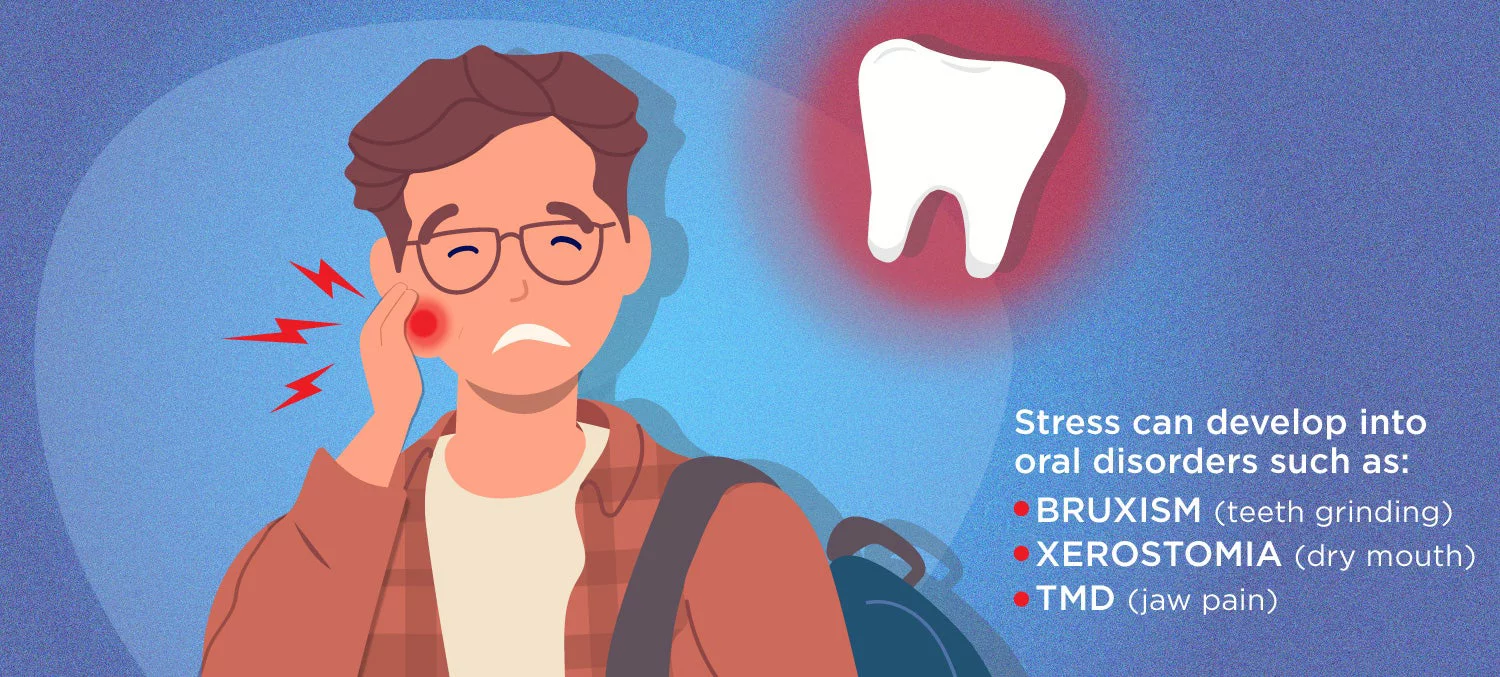Dental Care Guide for College Students
Importance of Oral Health for Student College Life
- Snacking
- Forgetting to brush your teeth
- Consuming more sugary drinks
- Added stress from class assignments and finances

Additionally, wisdom teeth can wreak havoc in your mouth because they often get infected or become impacted by the lack of room in your mouth. According to the American Dental Association, wisdom teeth begin erupting when a person is between 17-21 years old, which is when most people attend college. This potentially painful situation, often needing the teeth to be extracted, happens during the typical time young adults go off to college. Making sure you are continuing to see your dentist throughout your college years can help prevent a more dire situation from occurring.
Impact of Poor Dental Hygiene on Stress
Bruxism: Grinding your teeth while sleeping or unaware of clenching teeth during the day due to stress and anxiety.
Xerostomia: Stress can affect your salivary glands. Dry mouth negatively impacts the health of your teeth because your saliva works to wash away food and bacteria from your teeth and gums, and it brings beneficial minerals to your teeth to keep your mouth healthy. Without the production of saliva due to stress, your teeth may suffer.
Temporomandibular Disorders, or TMD: A set of conditions that cause pain in and around the jaw and cause it to not function properly. This study found that TMD is significantly linked with stress, anxiety, and depression.
How Oral Health and Mental Health Are Connected
How to Afford Dental Care as a College Student
Budgeting Tips for Unexpected Emergencies

Dental emergencies do not give you much wiggle room to wait and save up for a needed procedure. You may have a chipped tooth or a painful, impacted wisdom tooth that needs to be seen immediately.
- Decide how much you can comfortably save each month. If you can save even $25 a month to put away in case of a dental emergency, that cash will start to add up, so you won't have to scramble to find money to pay your bill.
- Eat out less often. If you typically go out to eat several times a week, choose one week out of the month to eat in your apartment or the cafeteria at school. This will help you put money aside for a dental emergency.
- Look for a job on campus. A part time job will certainly help your finances. Also, if your job is on or close to campus, you will end up n saving yourself time and gas money.
- Carpool or use public transportation. If you need to go off campus to grocery shop or do something fun, carpool or take a bus to save money on gas.
Common Available Student Resources
- The Department of Health and Humans Services provides a list of low-cost dental care facilities in your area
- Dental offices sometimes provide dental discounts for college students (You may have to ask your dentist)
- On-campus health services or dental clinics
- Dental schools often provide services at a lower cost
Health Insurance for Students
- The school offers student health plans: Some colleges provide optional health plans to students who do not have insurance. Read over the plan to see what it covers and then consider the cost of being covered by a campus health plan. Plans can cost between $2,000 and $4,000 for an academic year of coverage.
- You are covered by your parents' insurance if they declare you as a dependent: You can stay on your parents' health plan up until the age of 26 years old. If your parents' plan gives you dental coverage and you are happy with the plan's details, sticking with your parents' coverage is an easy way to be covered as a college student.
- Apply for an individual health plan as an independent: Through the Health Insurance Marketplace, you can apply for insurance based on your income rather than that of your parents.
Dental Financing
Break down large dental bills by using a financing marketplace like Smile Generation Financing Marketplace to connect you with options such as a credit card that can only be used for dental bills.
Find a Dentist Near Your Campus
Smile Generation connects college students with experienced local dentists who may provide discount dental plans and other dental financing so you can take care of your teeth while on your own for the first time. Use Smile Generation's Find a Dentist tool to find a dentist in your area so you can make an appointment today.
Find your trusted, local dentist today!
Sources
- Carrns, A. (2021, July 16). What you need to know about campus health insurance. The New York Times. Retrieved October 3, 2024, from https://www.nytimes.com/2021/07/16/your-money/college-health-insurance-plans.html
- Gholami, N., Hosseini Sabzvari, B., Razzaghi, A., & Salah, S. (2017, December 13). Effect of stress, anxiety and depression on unstimulated salivary flow rate and xerostomia. National Institutes of Health. Retrieved October 3, 2024, from https://www.ncbi.nlm.nih.gov/pmc/articles/PMC5768958/
- HealthCare.gov. (2023, August 14). In school? Student health plans and other options. Retrieved October 3, 2024, from https://www.healthcare.gov/young-adults/college-students/
- Kaur, P., Singh, S., Mathur, A., Makkar, D. K., Aggarwal, V. P., Batra, M., Sharma, A., & Goyal, N. (2017, April). Impact of dental disorders and its influence on self-esteem levels among adolescents. National Institutes of Health. Retrieved October 3, 2024, from https://www.ncbi.nlm.nih.gov/pmc/articles/PMC5449896/
- Namvar, M. A., Afkari, B. F., Moslemkhani, C., Mansoori, K., & Dadashi, M. (2021, December 16). The relationship between depression and anxiety with temporomandibular disorder symptoms in dental students. National Institutes of Health. Retrieved October 3, 2024, from https://pubmed.ncbi.nlm.nih.gov/35261658/
- National Institutes of Health. (2023, August 14). TMD (temporomandibular disorders). Retrieved October 3, 2024, from https://www.nidcr.nih.gov/health-info/tmd
- Mouth Healthy. (2023, August 14). Wisdom teeth. Retrieved October 3, 2024, from https://www.mouthhealthy.org/all-topics-a-z/wisdom-teeth
- U.S. Department of Health & Human Services. (2023, August 14). Where can I find low cost dental care? Retrieved October 3, 2024, from https://www.hhs.gov/answers/health-insurance-reform/where-can-i-find-low-cost-dental-care/index.html
Smile Generation blog articles are reviewed by a licensed dental professional before publishing. However, we present this information for educational purposes only with the intent to promote readers’ understanding of oral health and oral healthcare treatment options and technology. We do not intend for our blog content to substitute for professional dental care and clinical advice, diagnosis, or treatment planning provided by a licensed dental professional. Smile Generation always recommends seeking the advice of a dentist, physician, or other licensed healthcare professional for a dental or medical condition or treatment.








